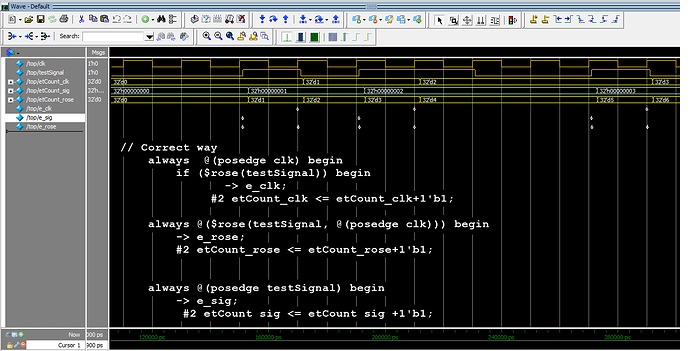In reply to katce:
A few comments and observations:
[list=1]
[*] On cover property (##[0:$]rose(testSignal));* You do not need the ##[0:]
[] There is a big difference between always @($rose(testSignal)) and always @(posedge testSignal) and always @(posedge clk) if($rose…
The correct way to code the supporting code is:
// Correct way
always @(posedge clk) begin
if ($rose(testSignal)) begin
-> e_clk;
#2 etCount_clk <= etCount_clk+1'b1;
end
end
Below is an image of the test result that explains the difference. Code is at http://systemverilog.us/vf/explain.sv
image at http://systemverilog.us/vf/explain.png
Ben Cohen
http://www.systemverilog.us/ ben@systemverilog.us
For training, consulting, services: contact http://cvcblr.com/home
- SVA Handbook 4th Edition, 2016 ISBN 978-1518681448
- A Pragmatic Approach to VMM Adoption 2006 ISBN 0-9705394-9-5
- Using PSL/SUGAR for Formal and Dynamic Verification 2nd Edition, 2004, ISBN 0-9705394-6-0
- Real Chip Design and Verification Using Verilog and VHDL, 2002 isbn 978-1539769712
- Component Design by Example ", 2001 ISBN 0-9705394-0-1
- VHDL Coding Styles and Methodologies, 2nd Edition, 1999 ISBN 0-7923-8474-1
- VHDL Answers to Frequently Asked Questions, 2nd Edition ISBN 0-7923-8115
- VF Horizons:PAPER: SVA Alternative for Complex Assertions - SystemVerilog - Verification Academy
- http://systemverilog.us/vf/SolvingComplexUsersAssertions.pdf
- “Using SVA for scoreboarding and TB designs”
http://systemverilog.us/papers/sva4scoreboarding.pdf - “Assertions Instead of FSMs/logic for Scoreboarding and Verification”
https://verificationacademy.com/verification-horizons/october-2013-volume-9-issue-3 - SVA in a UVM Class-based Environment
https://verificationacademy.com/verification-horizons/february-2013-volume-9-issue-1/SVA-in-a-UVM-Class-based-Environment
FREE BOOK: Component Design by Example
… A Step-by-Step Process Using VHDL with UART as Vehicle
